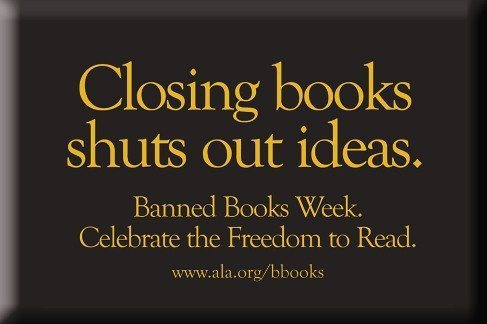Confessions of an Uncensored Childhood
In honor of Banned Books Week, I’d like to offer a few thoughts about what it was like growing up with parents who let me read (almost) anything I wanted (take them at face value).
I have what you may call “liberal parents,” politically and intellectually. This isn’t to say I was raised without limits, but when it came to literature, the doors were pretty wide open.
This factoid should surprise no one, but I was raised to be a reader. From fairy tales at bedtime to abridged children’s classics, it’s safe to say that literature is what shaped me. Not only was I encouraged to read, I was encouraged to ask questions. In the waiting room at the doctor’s office, for example, mom read me Little Bear. I vividly remember asking her, “How come Little Bear’s parents wore clothes, but he doesn’t?” Mom’s response: “I don’t know. Maybe his parents were just negligent. You should write your own version where he asks that question.” And you know what? I did. Among many other stories.
My brother, on the other hand, was more of a history and movie buff. He was watching war films like Saving Private Ryan at an age when many parents would still forbid PG-13 rated movies. I think for my parents, the historic content and possibility for education outweighed the rating (and in case you’re wondering, they didn’t allow either of us to watch whatever films we wanted. Movies weren’t automatically disallowed by their ratings alone, but rather why they earned those ratings. We weren’t allowed to watch mindless smut-fests like American Pie). This mindset continued to apply to my own reading material – some I picked on my own, like Grapes of Wrath, and others were required for English class, like All Quiet on the Western Front.
I should also mention that when you grow up Jewish, the Holocaust becomes an essential part of early education. And, by extension, history lessons about World War II in general. So questions about why Little Bear was allowed to run around naked, and the sexual content of Judy Blume books really didn’t seem like that big of a deal.
By not hiding the facts of the “real world” from us, my parents made it possible for my brother and I to be free to ask questions: why is there evil in the world? What do I do if my friends at school ask me if I want a cigarette? Why haven’t I gotten my period yet? What parent wouldn’t want their kids to be comfortable asking them these questions?
Because books related to these “hard topics” were available to me, I grew up finding solace in literature. I also began the hellish years of middle school with a realistic awareness that social life was about to get difficult, and sure enough it did: my dad was diagnosed with cancer for the first time. A classmate committed suicide. Insecurities about my body plagued me on an almost daily basis.
I sincerely believe that my access to ‘worldly’ literature prepared me for these things, rather than ruin my innocence. For that, I owe my parents nothing but gratitude. And when I read articles like these, where parents go to ridiculous lengths to purify their kids’ literature, I can’t help but feel sorry for those kids whenever they enter the ‘real world’ and discover it’s not as sanitized as mom made it seem. And, furthermore, will they have the right tools to defend their values if they have only read books that reinforced, rather than challenged what they were taught to believe?






